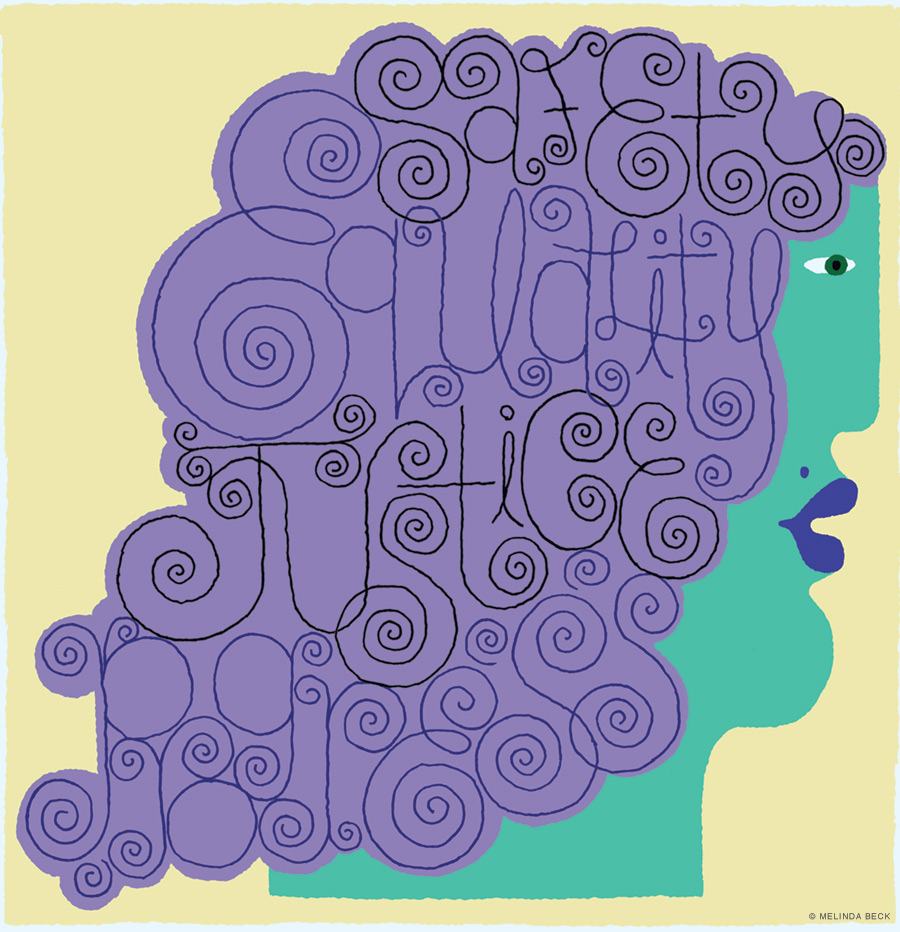
A former Penn history professor reflects on the fight for women’s equality at Penn.
“The early 1970s were heady years,” remarked Drew Gilpin Faust G’71 Gr’75 Hon’08 in an October talk about the history of women at Penn. “A number of forces were converging to provide equal opportunities for women: the law, the students, and women themselves.”
Faust, a president emerita of Harvard University [“Profiles,” May|Jun 2007] and a former history professor at Penn, spoke about a few women “who led the charge and led the change” at that time, during the annual Phoebe S. Leboy Lecture, hosted by the Penn Forum for Women Faculty. In the talk, titled “Remembering Not to Forget: Reflections on the Last Half Century of Women at Penn,” Faust began by paying tribute to the late Leboy, a biochemist and the first tenured woman on Penn Dental’s faculty, who worked “assiduously, strategically, and effectively to advance the place and the interests of women at Penn.” Leboy was head of the Women for Equal Opportunity at Penn (WEOUP), an organization founded in 1971 to pressure the University to develop a plan for affirmative action (and a precursor to the Penn Forum for Women Faculty).
Leboy’s colleague Mildred Cohn, a professor in the medical school, chaired the University Council’s Committee on the Status of Penn Women in 1969, which Leboy was on as well. In their first official analysis, the committee found that only 7 percent of Penn’s standing faculty were women. (To put it in perspective, as of 2021, 38 percent of standing faculty were women, according to Penn Data Warehouse.)
The reasons for the dearth of women faculty members at the time, Faust said, were that they were thought to be “not qualified” and didn’t write enough books or take their careers seriously enough. The committee recommended that “if a man and a woman are equally qualified, a woman at this juncture should be chosen.” It was one of the first calls for affirmative action for women faculty at the University.
Also in 1969 was the highly contested tenure of English professor Phyllis Rackin, an issue that WEOUP and a young secretary at Penn Vet named Carol Tracy CGS’76 kept in the public eye by insisting it be recorded in the University’s Almanac. Although Rackin’s colleagues voted their approval for her tenure twice, and more than 100 students petitioned on her behalf, the department chair blocked her promotion, threatening not to serve another term as chair if Rackin was in the department. “There was no place for unruly women,” said Faust.
When Rackin appealed to the University Committee on Academic Freedom and Responsibility, chaired by microbiology professor Helen Davies Gr’60 [“Obituaries,” Jul|Aug 2022], she eventually did get tenure—but not in the English department. She was instead placed in the General Honors program, where she was unable to teach graduate classes. Rackin sued the University and the case was settled in 1975, at which point she rejoined the English department. She taught for 40 years, retiring in 2002, but has continued to teach her popular Introduction to Shakespeare course through Spring 2022.
Two more events occurred in the early 1970s that paved the way for more gender equality at Penn. The first was a gang rape in March of 1973, in which two Penn nursing students were raped by five young men at 33rd and Chestnut Streets. “This was an especially horrifying incidence of a crime that was sadly not unfamiliar in university environs,” said Faust.
Over the next few days, hundreds of members of the Penn community rallied on College Green, and Tracy helped organize a sit-in at College Hall. When the director of safety and security at Penn suggested that women not wear provocative clothing, one student responded by saying, “It is my right to walk buck naked down the middle of campus and your responsibility to protect me.” Students made demands for improved security on campus, such as increased lighting, nighttime buses, more security guards, and even self-defense classes. The sit-in led to major reforms on campus, including the establishment of a women’s studies academic program and the Penn Women’s Center, which Tracy directed from 1977 to 1984 and which will mark 50 years on campus this year.
“When I emerged in 1975 with a PhD, there was a door open for me that would have never been there in 1970 when I began my graduate studies,” reflected Faust. Penn immediately offered her a full-time teaching job, which turned into a tenure-track position the next year. The specialist in the history of the antebellum South and Civil War period went on to spend 25 years on the faculty at Penn.
“The work done, and the risks taken, by Phoebe and others transformed Penn,” Faust said. “But they also transformed my life.”
Yet it was not an effortless shift, she warned, adding that there is still work to be done. “Penn women of the 1970s knew they had to struggle for a place at the University. That is the fundamental lesson they can teach us,” she said. “The arc of the moral universe does not just bend towards justice by itself; it has to be pushed.” —NP




